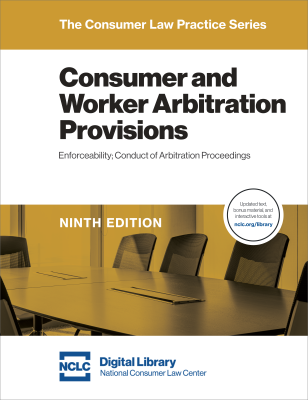Overview
A May 2019 Eleventh Circuit ruling in Freeman v. Smartpay Leasing, L.L.C., 2019 WL 1977199 (11th Cir. May 3, 2019), highlights how consumers can end up in court even after initially proceeding in arbitration. In a surprising number of cases, the business will not pay up to arbitrate, and the consumer can instead litigate in court.
In many cases, businesses require arbitration not because they necessarily prefer arbitration to court litigation. Sometimes they require arbitration solely to avoid class actions, and they assume that no one will ever actually pursue a case against them individually in arbitration. They are sometimes in for a rude awakening when a consumer does opt for individual arbitration.
Under both the American Arbitration Association (AAA) and JAMS rules, businesses must pay almost all of the hefty cost of consumer arbitration—around $5000 or more—while the consumer only pays a $200 or $250 filing fee. Many companies, such as smaller car dealerships, refuse to front this kind of money, and they are particularly unlikely to pay ongoing costs once an arbitrator starts ruling against them on preliminary issues like the scope of discovery.
In many cases, a business’s failure to pay its initial arbitration fee or the ongoing costs of arbitrator compensation will lead the AAA or JAMS to decline to arbitrate. The unavailability of arbitration due to the business’s conduct may be grounds to ask a court to find that the business has waived the right to require arbitration. Instead, the court should allow the consumer to bring the case to a court, even as a class action.
A business’s failure to pay its share of arbitration costs is not the only reason an arbitration forum will decline an arbitration case. Before the AAA will allow an arbitration case to proceed, the company must pay the AAA to review its arbitration clause, and the clause must meet AAA consumer due process standards. Similarly, the AAA sometimes will inform a company that it may not participate in AAA arbitration in the future, because in a past case it has not paid arbitration costs or its arbitration clause does not meet AAA standards.
Another surprising aspect of the AAA’s rules is that they allow consumers to litigate a case in small claims court despite an otherwise binding arbitration requirement. Finally, this article considers whether a business’s waiver of the arbitration agreement allows the consumer to bring a court action not only as an individual, but on behalf of a class.
AAA and JAMS Arbitration Fees Are Costly for a Business
In general, the AAA will apply its Consumer Arbitration Rules to almost any consumer dispute except those relating to home construction and remodeling, real estate purchases, and condominium or homeowner association by-laws. See AAA Consumer Arbitration Rule R-1.
To initiate arbitration under AAA’s Consumer Arbitration Rules, the consumer pays a $200 filing fee and meets the filing requirements. That is the total amount the consumer must pay for the arbitration, no matter the length of the arbitration hearing. If the arbitration case is dropped because the business does not pay its fees, the $200 is refunded. See AAA Consumer Arbitration Rule R-4. In addition, Rule R-4 provides that the AAA may, in the event of the consumer’s extreme hardship, defer or reduce the $200 amount.
Under AAA’s Consumer Arbitration Rules, once the consumer has paid $200 and meets the AAA’s filing requirements, the business must then pay $1700 in case management and filing fees. As described in more detail below, the business must also pay $250 for the AAA to review the arbitration agreement unless the agreement is already currently registered.
If the consumer opts for a documents-only arbitration, the business pays another $1500. If the document-only arbitration requires more than 7 hours, or involves more than 100 pages of documents, the business pays $300/hr. for the excess amount.
If the consumer opts for an in-person or telephone hearing, the business pays the full cost of the hearing at a rate of $2500/day plus a $500 hearing fee. Payment is due early in the procedure. AAA rules set out additional fees that are paid by the business.
The JAMS fee schedule for consumer arbitrations is somewhat different. The consumer’s total obligation is $250. The business initially pays $950 and then 100% of the arbitrator’s fee, which will be hundreds of dollars an hour, plus a 12% JAMS case management fee. JAMS rules for consumer arbitration apply where an arbitration clause is found in a contract with a consumer, drafted by the defendant, and that the consumer was required to accept. JAMS’ Consumer Arbitration Minimum Standards require that the arbitration agreement itself be consistent with the above described fee schedule.
Smartpay Leasing Holds That Non-Payment of Arbitration Costs Waives Arbitration Requirement
In Smartpay Leasing, the Eleventh Circuit found that the business waived its right to enforce the arbitration agreement because Smartpay Leasing’s failure to pay the initial arbitration fee resulted in JAMS dismissing the consumer’s arbitration action. As a result, the consumer can bring the action in court, despite the arbitration agreement. Smartpay Leasing thus joins a growing number of cases that find that a business’ failure to pay arbitration fees waives the arbitration requirement, allowing the consumer to bring the case in court. See NCLC’s Consumer Arbitration Agreements § 8.4.4. Note also that AAA Consumer Arbitration Rule R-1(d) states that: “Should the AAA decline to administer an arbitration, either party may choose to submit its dispute to the appropriate court for resolution.”
Smartpay Leasing is significant not only because it is a recent circuit court opinion finding failure to pay to waive the arbitration agreement. The Eleventh Circuit in the case rejected a series of Smartpay Leasing’s arguments to the contrary that may come up in other cases.
Smartpay argued that the consumer had the right under the arbitration clause to bring an arbitration proceeding either before JAMS or the AAA. If JAMS would not conduct the arbitration without a fee, the consumer should have gone to the AAA. The Eleventh Circuit rejected this argument. The consumer under the agreement had a right to choose JAMS. In addition, the AAA consumer rules had a similar fee structure to the one for JAMS that the company had failed to pay.
Smartpay Leasing’s arbitration agreement required that each party pay their own attorney fees and other arbitration costs, and the company argued that this overrode the JAMS requirement that Smartpay Leasing pay almost all the arbitration costs. The Eleventh Circuit found that Smartpay Leasing had agreed to JAMS arbitration and was bound by the JAMS policy, despite the arbitration agreement. In addition, the JAMS policy was not inconsistent with the arbitration agreement. The arbitration agreement required the consumer to bear all of the consumer’s own arbitration costs, which under JAMS rules was only the $250 filing fee, and which the consumer had already paid.
The Eleventh Circuit did not address the conflict between the JAMS fee schedule and an arbitration clause requiring both parties to split all arbitration costs. But the result should be the same. The company should have to comply with the JAMS fee schedule or JAMS should refuse to handle the arbitration.
Smartpay Leasing also argued that waiver can only be found where the consumer is prejudiced by the company’s actions. The Eleventh Circuit, while not ruling whether prejudice was required, found prejudice because the consumer had a right to JAMS arbitration, and that right was taken away from the consumer.
Smartpay Leasing further argued that JAMS’ consumer rules did not apply because one of the prerequisites of application of the JAMS’ consumer rules is that the consumer was required to accept the arbitration provision. Smartpay Leasing’s arbitration agreement allowed the consumer to opt out of the requirement for a period of time. But JAMS interpreted its own consumer standards as applying, even where the agreement had an opt-out option, as long as the consumer has to take affirmative action to opt-out. If Smartpay Leasing wanted to dispute this interpretation, it was required do so before the arbitrator and not by refusing to participate in the arbitration. This is an important illustration of the deference to an arbitrator being used against the company.
Finally, Smartpay argued that the Federal Arbitration Act at 9 U.S.C. § 3 did not apply. That provision provides that if an arbitration agreement is enforceable, the trial should be stayed until the arbitration is completed, provided the defendant is not “in default in proceeding with such arbitration.” Smartpay argued that the arbitration had not begun, so Smartpay could not be in default in proceeding with such arbitration. The Eleventh Circuit had no problem dismissing this claim.
Other Defendant Failings That Disqualify AAA Arbitration
AAA Consumer Arbitration Rules require that, before the AAA will accept an arbitration filing, that the company must pay the AAA $250 to review the company’s arbitration agreement to make sure it meets the AAA’s minimum due process standards for consumer arbitrations. If the agreement passes that requirement and the company continues to pay the $250 annual fee, then the company appears on the AAA’s list of registered arbitration agreements. At present 495 companies are listed alphabetically on the registry and one can search for a particular business’s name.
If the company’s arbitration clause is not found on the registry at the time the case is filed, the company must pay $250 at that time for the clause to be reviewed. If the company fails to do so, or if the clause fails to pass the review, then the AAA will decline to administer the arbitration and will decline any future arbitrations involving that business until the business completes the registration process and its arbitration agreement complies with AAA standards. The AAA instead may agree to provide arbitration under the company’s arbitration agreement if the agreement is reformed to avoid violation of AAA standards.
According to the AAA, it will send the business a letter dismissing the arbitration and refusing future arbitrations with that company because of its non-complying agreement, but such letters cannot be found on the AAA website. The letters will have to be obtained either through discovery with the business or from the AAA. The AAA sends similar letters to a business refusing future arbitrations involving that business when the business has failed to pay its required arbitration dues in an arbitration the consumer filed with the AAA.
AAA Consumer Arbitration Rule R-12 states that failure of an agreement to be registered allows the consumer to bring the dispute in court instead of arbitration. See also AAA Consumer Arbitration Rule R-54 concerning remedies for non-payment of arbitration fees. But the AAA may allow the company to reform the arbitration clause, register it, and compel the case into arbitration, even though the clause had not been registered before. If you experience such a unilateral change in an arbitration agreement, please email [email protected].
Where the business is willing to pay all AAA fees, but the AAA rejects the arbitration agreement because it does not meet the AAA’s standards, the consumer can also argue that the arbitration clause is unenforceable because designation of the AAA is integral to the arbitration agreement, and the arbitration agreement cannot be carried out according to its terms. The other option for a court is to appoint an arbitrator itself—in that case the consumer should argue that, just with AAA arbitration, the company should pay the arbitrator’s fees.
Courts will determine whether the AAA’s unavailability makes arbitration unenforceable depending on whether the AAA’s designation is integral to the contract or only ancillary. Much will depend on the language of the arbitration agreement, but courts have found for many agreements that the arbitration forum’s designation is integral. See the discussion at NCLC’s Consumer Arbitration Agreements § 5.8.
Information to Seek to Document Arbitration Forum’s Unavailability
When it declines to arbitrate a case, the arbitration forum will inform both parties in writing. The letter will typically explain the reason for the denial, and this should be sufficient to go to court to argue the arbitration requirement has been waived.
Here are excerpts from one such AAA letter to a consumer lawyer initiating an arbitration:
We must, at this time, decline to administer this claim and any other claims between xxxxxx Corporation and its consumers because the business failed to comply with the AAA's policies regarding consumer claims… On a previously-filed consumer matter, this business did not timely submit its share of the filing fees and/or failed to waive a provision in its consumer contract that the AAA identified as a material and substantial deviation from the Protocol. … In addition, xxxx Corporation has not complied with our request to register its consumer clause on the AAA's Consumer Clause Registry . . . Accordingly, we have administratively closed our file and will refund any payment received by the filing party. . . . either party may choose to submit its dispute to the appropriate court for resolution.
Sometimes the arbitration forum will be very slow in sending such a letter, and the consumer may wish to go to court without waiting for the letter. One option is to obtain all correspondence and emails between the arbitration forum and the business. The forum will not be shy in demanding payment and a series of letters requesting payment and indicating payment is still due may be enough to show the business’ waiver. The same should be true with any AAA correspondence seeking from the business the fee and arbitration agreement to review for compliance with the AAA due process requirements. The business’ name not appearing on the AAA registry is another piece of evidence.
Also seek any correspondence coming from the AAA or another forum to the business, where the forum indicates it will not arbitrate any dispute in the future involving that business because of the business’ past failure to pay arbitration fees or register the arbitration agreement.
AAA Rules Allow Consumers to Avoid Arbitration and Go Straight to a Small Claims Court Option
Whenever an arbitration clause requires AAA arbitration or arbitration under AAA rules, the consumer always has the option to sue in small claims court instead of AAA arbitration. AAA Consumer Arbitration Rule R-9, Small Claims Option for the Parties provides that the consumer need not even first file a claim with the AAA. The rules do not define a small claims court, so it is unclear what court in a given state is considered a small claims court, but in some states the applicable court may allow for a sizeable consumer recovery.
Going to small claims court is a useful option not only to avoid arbitration from the beginning, but when a business refuses to arbitrate by paying its required fees. Instead of seeking a court order that the arbitration agreement is unenforceable, the consumer can immediately litigate the dispute in small claims court. Another option when the business refuses to pay arbitration costs is for the consumer to front the arbitration costs, and seek their recovery as part of the arbitration award. See AAA Consumer Arbitration Rule R-54(a).
Does Waiver of Individual Arbitration Requirement Allow for Class Actions in Court?
If a business refuses to participate in an arbitration proceeding, and a court finds the arbitration requirement thus unenforceable, an issue with practical significance is whether the action can then be brought in court on behalf of a class. Since the defendant has waived the arbitration requirement for the class representative, the class representative can clearly file the case as a class action.
The more important question is whether the action can be certified as a class pursuant to Federal Rule 23(b)(3). The question is whether the predominance and numerosity requirements can be met where other class members (and sometimes all the other class members) may be subject to the same arbitration agreement that was found unenforceable as to the class representative pursuant to the company’s waiver.
Some courts may rule that the fact that other class members may be subject to an arbitration requirement does not bar class certification. The court should not make this determination at the class certification stage, but instead should postpone determination of whether particular individuals should be excluded from the class until later when the defendant must provide specific, individual evidence regarding individual class members.
Even when courts address these issues at the certification stage, they are a basis for denying certification only where the defendant can show that numerous putative class members are covered by binding arbitration agreements. In the case where the company has waived the arbitration agreement with the class representative, this will mean the company producing evidence that the same waiver will not also apply to the other class members. See NCLC’s Consumer Arbitration Agreements § 2.7.
It may be possible to argue that the experience of the class representative as to the defendant’s non-participation in the arbitration is applicable to other class members. A good example of this is where the AAA has informed the defendant that it will not conduct any arbitration involving that defendant, because of its failure to pay arbitration fees or have its arbitration agreements registered as in compliance with AAA consumer standards.



